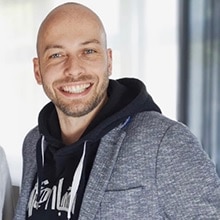The agile organisation of work in the craft sector
A baker organises himself agilely – sounds funny, but that’ s how it is.
If you have been thinking: “Cool, the agile bun”, then this is a relatively normal first reaction. The reaction is funny, but somehow it’s complete nonsense. The exciting thing about crafts is that the sentence “If our product does not bring any added value for our users, nobody will pay for it” has an existential effect in this industry. A baker who doesn’t care about his customers’ tastes has a problem in the long run. Regional customs and the tradition of craftsmanship play an important role here.
Of course, you don’t have to tell craftsmen about user centring. That would only lead to a shake of the head. But the craft sector also faces challenges. What challenges does a modern handicraft baker face, for example? Why and how can agile working methods help to establish a stable and flexible organisation?
Challenges in crafts
The Zentralverband des deutschen Bäckerhandwerks e.V. (Central Association of the German Bakery Trade) succeeded in making German bread culture an intangible UNESCO World Cultural Heritage Site in 2015. There are currently around 11,300 bakeries in Germany, but the number is falling steadily. This means that Brotland Germany has slipped from the number of bakeries to second place behind France. Although the number of branches is increasing, the smaller craft businesses in particular are having to close. Baking stations are also increasing the pressure on craft bakers. The shelves, which are booming in supermarkets and are equipped with industrially manufactured goods made from raw materials from the world market, have nothing to do with a carefully manufactured handicraft product. In addition, the often family-run craft businesses face the difficult challenge of company succession. Numerous German bakeries are currently operating in this uncertain environment.
What is often taken for granted in large corporations, IT companies and agencies, has not yet been well received by medium-sized craft businesses: digitisation. Even financial support from the federal government for the digitisation of the craft trades is rarely called upon. Digitisation as well as new and agile working methods are excellently suited for the craft trades.
Focus on the organisation of work
The Bergmann Bakery is a family bakery from Thuringia in Germany. It has almost 50 branches and is therefore a medium-sized bakery. For more than one and a half years, the company has been on the way to using the advantages of agile working methods for the organisation and to developing them further for itself. It all began with Matthias Bergmann’s desire to establish more innovation and entrepreneurial action in the management area of the bakery’s sales organisation. At the beginning of the trip, the junior boss knew that it would be a longer process.
Quote: “We knew that we were way ahead when it came to our abilities and processes when it came to baking – but in the organisation of our work we are totally at the beginning.
After several intensive and insightful workshops on potential development, communication and the gentle introduction of agile working methods, it quickly became clear that the potential for innovation had long been deeply anchored in the company. The chaotic structure, which grew to almost 50 branches between 2005 and 2019 as a result of growth, is also common in smaller bakery businesses.
A branch has several employees and, depending on the number of employees, a branch management. Several branches are organised according to geographical divisions by sales managers. There is also the sales manager. Depending on the size of the bakery, there is an additional level between the head of sales and the sales managers. Topics are therefore carried up and down this hierarchy in a person-related, linear way. A connection from this sales organisation to the bakery (where the products are actually created) or logistics is established via the management personalities. Urgent cases, especially in shift planning or special incidents, can also skip a step in communication. There is also the reverse approach, that some rules only apply sometimes. So what could be done to improve the organisation of work and processes?
The team and the tasks
The ability of the group of managers to see themselves as a joint team and to act accordingly had the greatest effect. In this team, the joint projects were discussed in regular joint meetings with a clear structure. The tasks were taken on their own initiative according to their respective strengths. This led to a
- better understanding of each other’s abilities,
- collegial support based on the respective strengths,
- a greater willingness to take on tasks in the area of colleagues if required,
- a greater exchange of knowledge throughout the entire branch area
and even more. The management team of the sales department worked its way through the year with the support of Agile Coaches. The benefits of this new, transparent cooperation, which was organised via meetings and a task board, had to prove itself economically some time later.
Baptism of fire
The real baptism of fire for this new work organisation was the Backstubenfest, one of the most important days in the year of the Bergmann bakery. An open day on which the bakery presents itself with the entire bio-regional added value to its customers at a farm festival. On this day, the village of approx. 500 inhabitants and the local bakery become an annual culinary-touristic attraction for over 4000 people from the region.
The preparation of this day has always been an extraordinary feat of strength for the entire company. Thanks to the new self-organised structure, transparency and agile way of working, the entire bakery team was able to organise the 2019 event without any stress. The otherwise usual and nerve-racking micromanagement was avoided. This means in detail:
- Shift plans and construction work were made more than a day in advance,
- the program had more points than in any previous year,
- the guests stayed on average one hour longer,
- a newly introduced stand for applications was able to hold more than 100 interviews and was pleased to receive an above-average number of applications.
- With approximately the same number of guests as in the previous year, the turnover on this day increased by almost 25%.
And why is this day so important? The bakery has been using it for years to test innovations in the product area and in its processes. If an idea can withstand the onslaught on this day, it has the potential to make a positive contribution to the future of the entire bakery, the region and all its customers. And the introduction of agile working methods has helped the bakery to be more successful and innovative, the easiest to read and the most quantifiable by the particularly successful Bakstubenfest 2019.
We wish you a good appetite with your trusted baker.
Notes:
This is a joint contribution by Sebastian Daume and Daniel Dubbel. If you want to find out more about the two authors, take a look at YNEO.org.
If you like the article or would like to discuss it, please feel free to share it in your network.
Daniel Dubbel has published another post in the t2informatik Blog:

Sebastian Daume

Daniel Dubbel
With over 24 years of professional experience, including more than 16 years agile in various roles, Daniel Dubbel’s goal is always to improve collaboration in teams, departments and organisations for great employees in successful companies for satisfied customers.
He has been working at DB Systel GmbH, Deutsche Bahn’s digitalisation pioneer, since 2018 and has shared management responsibility for 100 employees in a unit that develops front-end solutions and mobile apps for DB since 2019.
